Diabetes in Social and Psychological Contexts: Empowerment Strategies
VerifiedAdded on 2022/11/25
|19
|6159
|131
Essay
AI Summary
This assignment delves into the concept of empowerment within the context of diabetes management, emphasizing its crucial role in fostering patient self-management. It explores how empowerment strategies can be applied across three distinct life stages: adolescence, middle age, and older adulthood, acknowledging the unique challenges and transitions inherent in each. The essay discusses the importance of patient education and support systems in facilitating informed decision-making and promoting effective self-care behaviors. It highlights the significance of healthcare professionals adopting a patient-centered approach, providing tailored interventions and resources to empower individuals and their families to navigate the complexities of living with diabetes. The discussion encompasses evidence-based strategies to address the psychological, emotional, and social aspects of diabetes management, aiming to improve patient outcomes and enhance their overall quality of life.
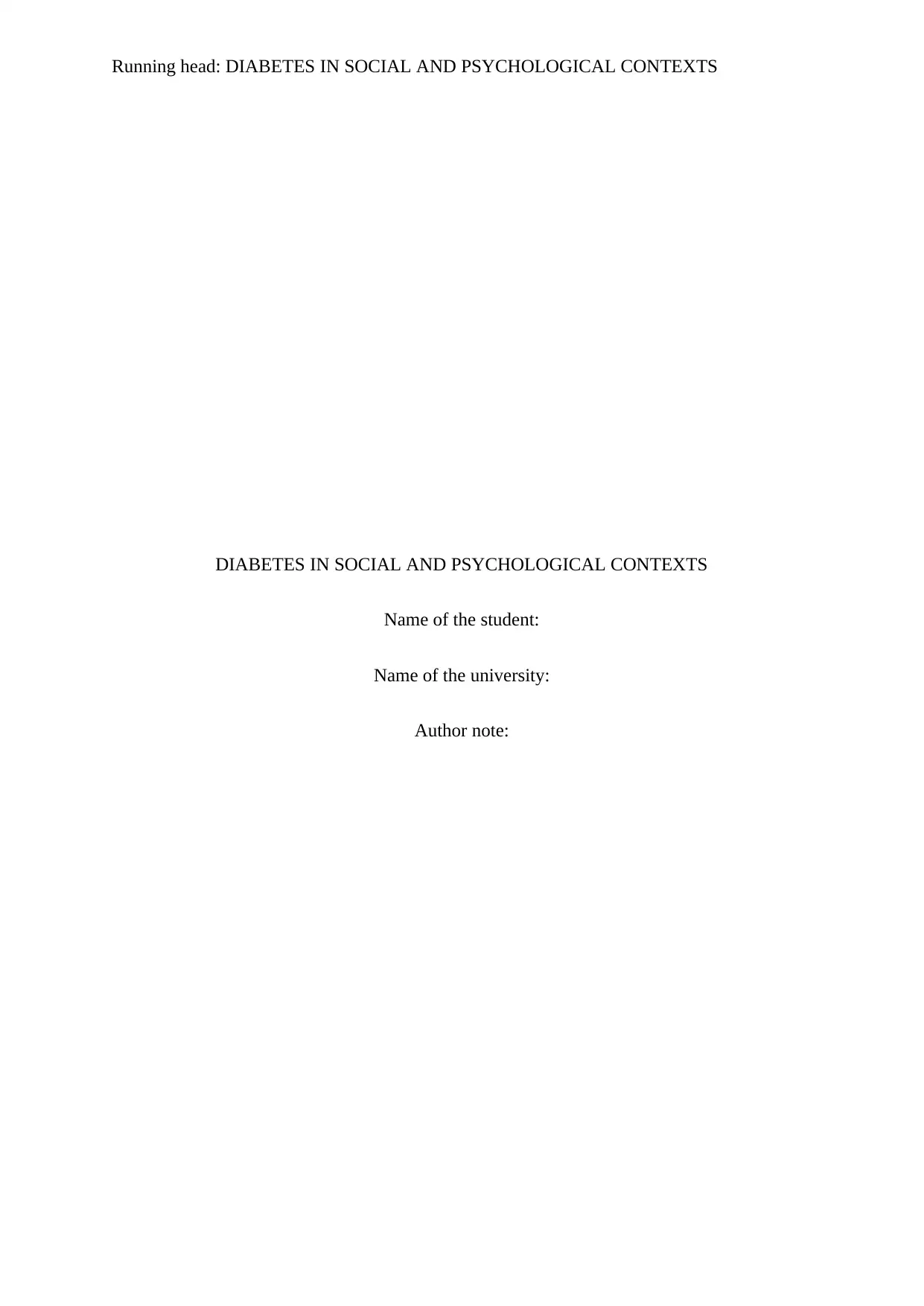
Running head: DIABETES IN SOCIAL AND PSYCHOLOGICAL CONTEXTS
DIABETES IN SOCIAL AND PSYCHOLOGICAL CONTEXTS
Name of the student:
Name of the university:
Author note:
DIABETES IN SOCIAL AND PSYCHOLOGICAL CONTEXTS
Name of the student:
Name of the university:
Author note:
Paraphrase This Document
Need a fresh take? Get an instant paraphrase of this document with our AI Paraphraser
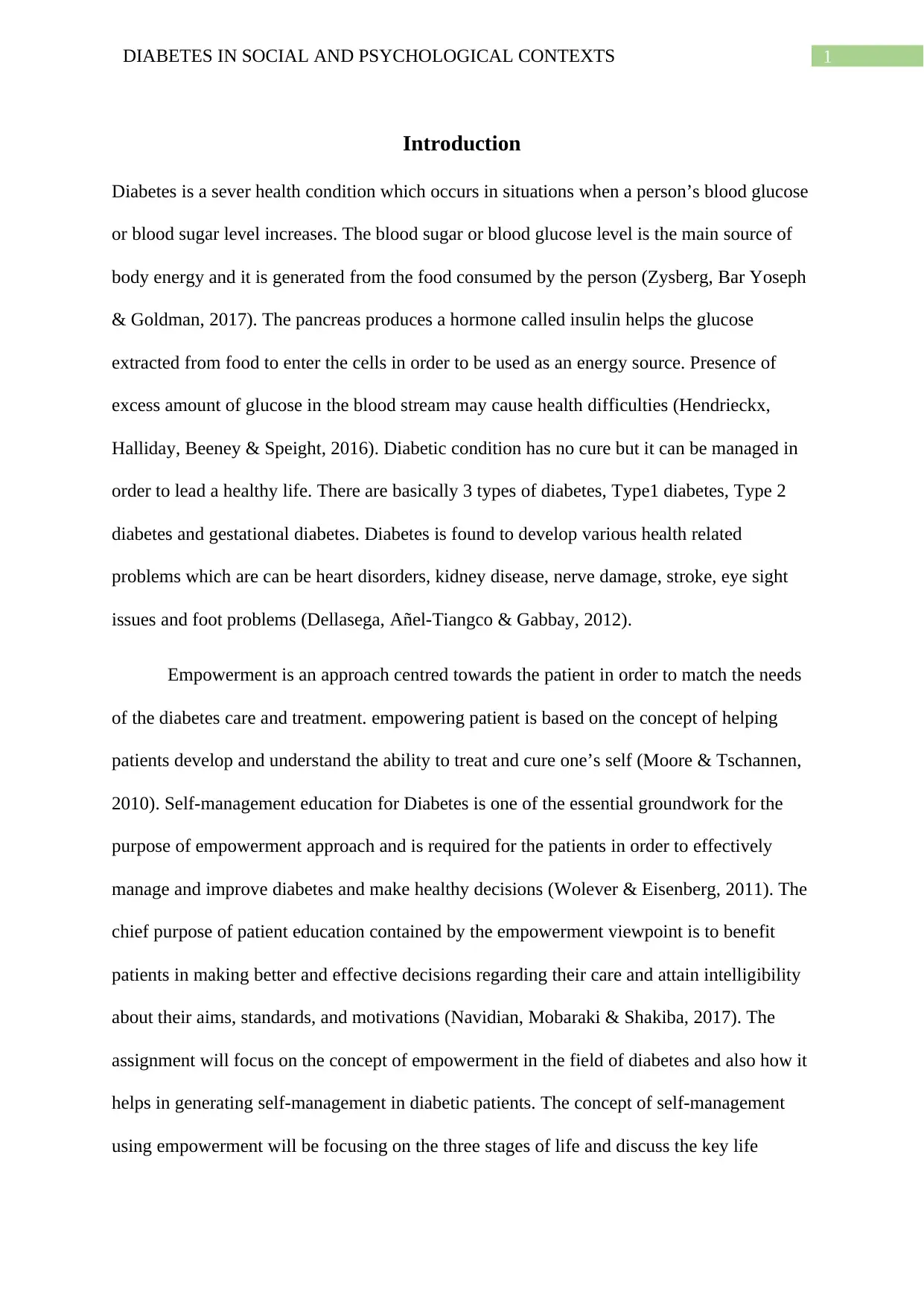
1DIABETES IN SOCIAL AND PSYCHOLOGICAL CONTEXTS
Introduction
Diabetes is a sever health condition which occurs in situations when a person’s blood glucose
or blood sugar level increases. The blood sugar or blood glucose level is the main source of
body energy and it is generated from the food consumed by the person (Zysberg, Bar Yoseph
& Goldman, 2017). The pancreas produces a hormone called insulin helps the glucose
extracted from food to enter the cells in order to be used as an energy source. Presence of
excess amount of glucose in the blood stream may cause health difficulties (Hendrieckx,
Halliday, Beeney & Speight, 2016). Diabetic condition has no cure but it can be managed in
order to lead a healthy life. There are basically 3 types of diabetes, Type1 diabetes, Type 2
diabetes and gestational diabetes. Diabetes is found to develop various health related
problems which are can be heart disorders, kidney disease, nerve damage, stroke, eye sight
issues and foot problems (Dellasega, Añel-Tiangco & Gabbay, 2012).
Empowerment is an approach centred towards the patient in order to match the needs
of the diabetes care and treatment. empowering patient is based on the concept of helping
patients develop and understand the ability to treat and cure one’s self (Moore & Tschannen,
2010). Self-management education for Diabetes is one of the essential groundwork for the
purpose of empowerment approach and is required for the patients in order to effectively
manage and improve diabetes and make healthy decisions (Wolever & Eisenberg, 2011). The
chief purpose of patient education contained by the empowerment viewpoint is to benefit
patients in making better and effective decisions regarding their care and attain intelligibility
about their aims, standards, and motivations (Navidian, Mobaraki & Shakiba, 2017). The
assignment will focus on the concept of empowerment in the field of diabetes and also how it
helps in generating self-management in diabetic patients. The concept of self-management
using empowerment will be focusing on the three stages of life and discuss the key life
Introduction
Diabetes is a sever health condition which occurs in situations when a person’s blood glucose
or blood sugar level increases. The blood sugar or blood glucose level is the main source of
body energy and it is generated from the food consumed by the person (Zysberg, Bar Yoseph
& Goldman, 2017). The pancreas produces a hormone called insulin helps the glucose
extracted from food to enter the cells in order to be used as an energy source. Presence of
excess amount of glucose in the blood stream may cause health difficulties (Hendrieckx,
Halliday, Beeney & Speight, 2016). Diabetic condition has no cure but it can be managed in
order to lead a healthy life. There are basically 3 types of diabetes, Type1 diabetes, Type 2
diabetes and gestational diabetes. Diabetes is found to develop various health related
problems which are can be heart disorders, kidney disease, nerve damage, stroke, eye sight
issues and foot problems (Dellasega, Añel-Tiangco & Gabbay, 2012).
Empowerment is an approach centred towards the patient in order to match the needs
of the diabetes care and treatment. empowering patient is based on the concept of helping
patients develop and understand the ability to treat and cure one’s self (Moore & Tschannen,
2010). Self-management education for Diabetes is one of the essential groundwork for the
purpose of empowerment approach and is required for the patients in order to effectively
manage and improve diabetes and make healthy decisions (Wolever & Eisenberg, 2011). The
chief purpose of patient education contained by the empowerment viewpoint is to benefit
patients in making better and effective decisions regarding their care and attain intelligibility
about their aims, standards, and motivations (Navidian, Mobaraki & Shakiba, 2017). The
assignment will focus on the concept of empowerment in the field of diabetes and also how it
helps in generating self-management in diabetic patients. The concept of self-management
using empowerment will be focusing on the three stages of life and discuss the key life
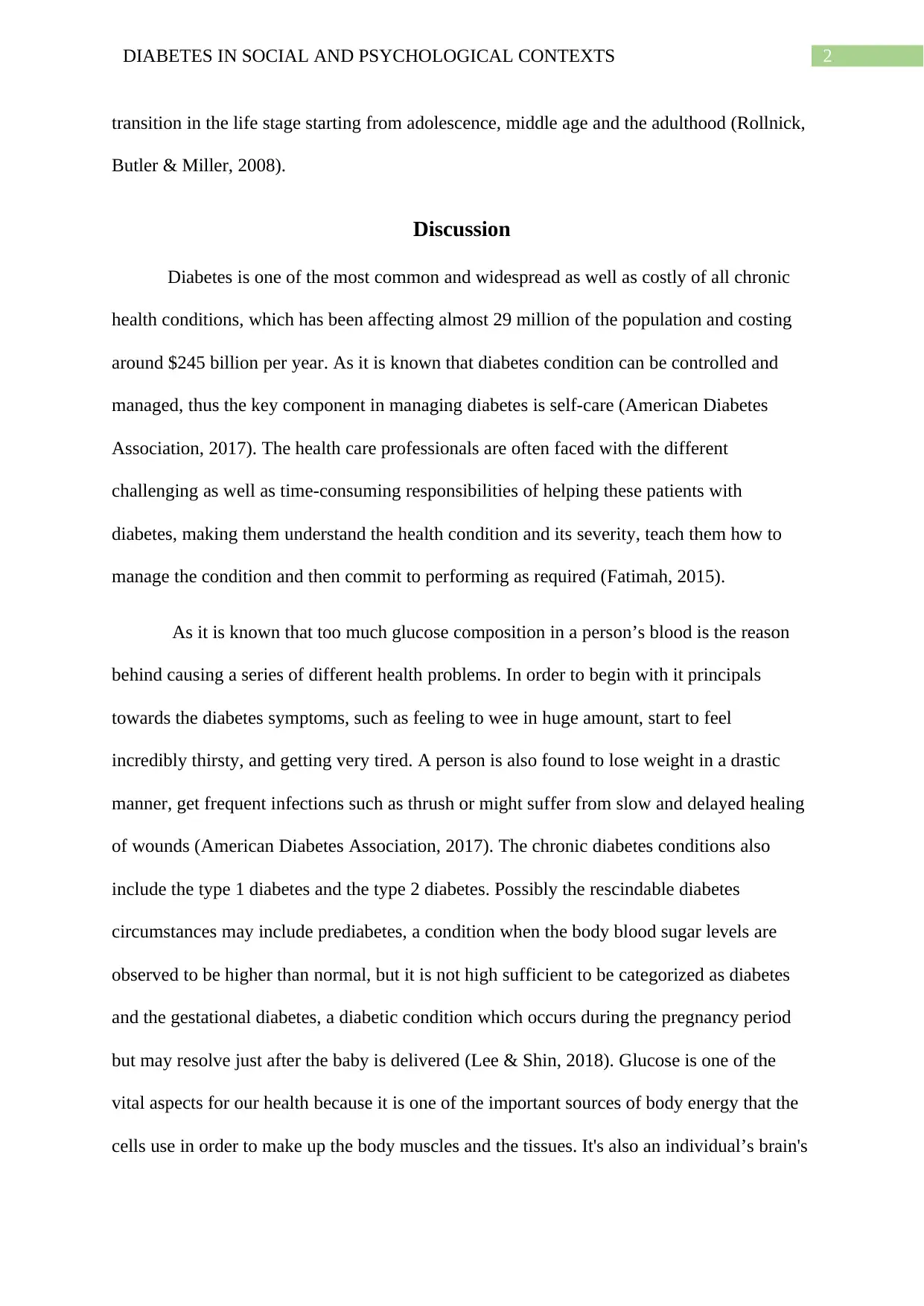
2DIABETES IN SOCIAL AND PSYCHOLOGICAL CONTEXTS
transition in the life stage starting from adolescence, middle age and the adulthood (Rollnick,
Butler & Miller, 2008).
Discussion
Diabetes is one of the most common and widespread as well as costly of all chronic
health conditions, which has been affecting almost 29 million of the population and costing
around $245 billion per year. As it is known that diabetes condition can be controlled and
managed, thus the key component in managing diabetes is self-care (American Diabetes
Association, 2017). The health care professionals are often faced with the different
challenging as well as time-consuming responsibilities of helping these patients with
diabetes, making them understand the health condition and its severity, teach them how to
manage the condition and then commit to performing as required (Fatimah, 2015).
As it is known that too much glucose composition in a person’s blood is the reason
behind causing a series of different health problems. In order to begin with it principals
towards the diabetes symptoms, such as feeling to wee in huge amount, start to feel
incredibly thirsty, and getting very tired. A person is also found to lose weight in a drastic
manner, get frequent infections such as thrush or might suffer from slow and delayed healing
of wounds (American Diabetes Association, 2017). The chronic diabetes conditions also
include the type 1 diabetes and the type 2 diabetes. Possibly the rescindable diabetes
circumstances may include prediabetes, a condition when the body blood sugar levels are
observed to be higher than normal, but it is not high sufficient to be categorized as diabetes
and the gestational diabetes, a diabetic condition which occurs during the pregnancy period
but may resolve just after the baby is delivered (Lee & Shin, 2018). Glucose is one of the
vital aspects for our health because it is one of the important sources of body energy that the
cells use in order to make up the body muscles and the tissues. It's also an individual’s brain's
transition in the life stage starting from adolescence, middle age and the adulthood (Rollnick,
Butler & Miller, 2008).
Discussion
Diabetes is one of the most common and widespread as well as costly of all chronic
health conditions, which has been affecting almost 29 million of the population and costing
around $245 billion per year. As it is known that diabetes condition can be controlled and
managed, thus the key component in managing diabetes is self-care (American Diabetes
Association, 2017). The health care professionals are often faced with the different
challenging as well as time-consuming responsibilities of helping these patients with
diabetes, making them understand the health condition and its severity, teach them how to
manage the condition and then commit to performing as required (Fatimah, 2015).
As it is known that too much glucose composition in a person’s blood is the reason
behind causing a series of different health problems. In order to begin with it principals
towards the diabetes symptoms, such as feeling to wee in huge amount, start to feel
incredibly thirsty, and getting very tired. A person is also found to lose weight in a drastic
manner, get frequent infections such as thrush or might suffer from slow and delayed healing
of wounds (American Diabetes Association, 2017). The chronic diabetes conditions also
include the type 1 diabetes and the type 2 diabetes. Possibly the rescindable diabetes
circumstances may include prediabetes, a condition when the body blood sugar levels are
observed to be higher than normal, but it is not high sufficient to be categorized as diabetes
and the gestational diabetes, a diabetic condition which occurs during the pregnancy period
but may resolve just after the baby is delivered (Lee & Shin, 2018). Glucose is one of the
vital aspects for our health because it is one of the important sources of body energy that the
cells use in order to make up the body muscles and the tissues. It's also an individual’s brain's
⊘ This is a preview!⊘
Do you want full access?
Subscribe today to unlock all pages.

Trusted by 1+ million students worldwide
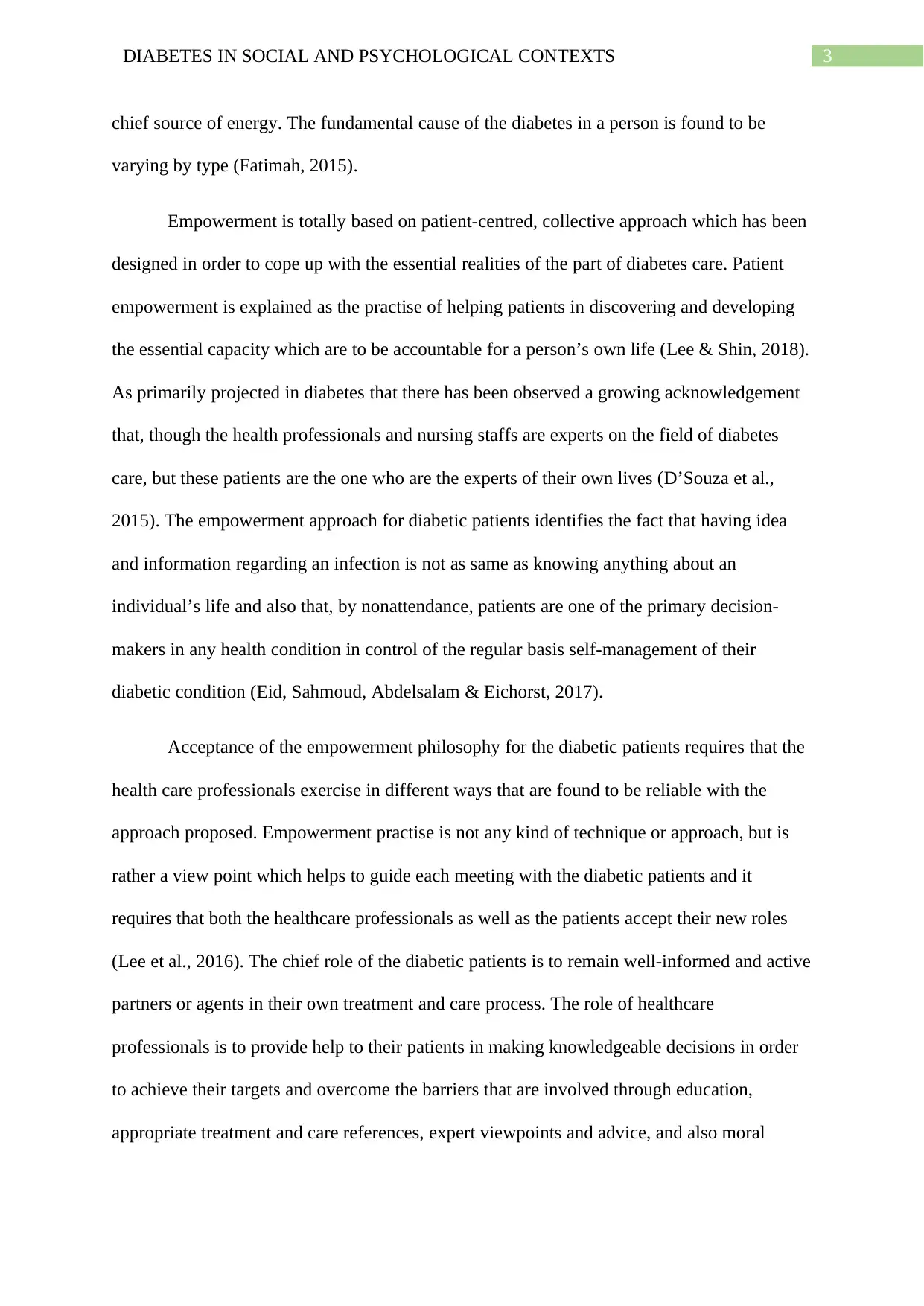
3DIABETES IN SOCIAL AND PSYCHOLOGICAL CONTEXTS
chief source of energy. The fundamental cause of the diabetes in a person is found to be
varying by type (Fatimah, 2015).
Empowerment is totally based on patient-centred, collective approach which has been
designed in order to cope up with the essential realities of the part of diabetes care. Patient
empowerment is explained as the practise of helping patients in discovering and developing
the essential capacity which are to be accountable for a person’s own life (Lee & Shin, 2018).
As primarily projected in diabetes that there has been observed a growing acknowledgement
that, though the health professionals and nursing staffs are experts on the field of diabetes
care, but these patients are the one who are the experts of their own lives (D’Souza et al.,
2015). The empowerment approach for diabetic patients identifies the fact that having idea
and information regarding an infection is not as same as knowing anything about an
individual’s life and also that, by nonattendance, patients are one of the primary decision-
makers in any health condition in control of the regular basis self-management of their
diabetic condition (Eid, Sahmoud, Abdelsalam & Eichorst, 2017).
Acceptance of the empowerment philosophy for the diabetic patients requires that the
health care professionals exercise in different ways that are found to be reliable with the
approach proposed. Empowerment practise is not any kind of technique or approach, but is
rather a view point which helps to guide each meeting with the diabetic patients and it
requires that both the healthcare professionals as well as the patients accept their new roles
(Lee et al., 2016). The chief role of the diabetic patients is to remain well-informed and active
partners or agents in their own treatment and care process. The role of healthcare
professionals is to provide help to their patients in making knowledgeable decisions in order
to achieve their targets and overcome the barriers that are involved through education,
appropriate treatment and care references, expert viewpoints and advice, and also moral
chief source of energy. The fundamental cause of the diabetes in a person is found to be
varying by type (Fatimah, 2015).
Empowerment is totally based on patient-centred, collective approach which has been
designed in order to cope up with the essential realities of the part of diabetes care. Patient
empowerment is explained as the practise of helping patients in discovering and developing
the essential capacity which are to be accountable for a person’s own life (Lee & Shin, 2018).
As primarily projected in diabetes that there has been observed a growing acknowledgement
that, though the health professionals and nursing staffs are experts on the field of diabetes
care, but these patients are the one who are the experts of their own lives (D’Souza et al.,
2015). The empowerment approach for diabetic patients identifies the fact that having idea
and information regarding an infection is not as same as knowing anything about an
individual’s life and also that, by nonattendance, patients are one of the primary decision-
makers in any health condition in control of the regular basis self-management of their
diabetic condition (Eid, Sahmoud, Abdelsalam & Eichorst, 2017).
Acceptance of the empowerment philosophy for the diabetic patients requires that the
health care professionals exercise in different ways that are found to be reliable with the
approach proposed. Empowerment practise is not any kind of technique or approach, but is
rather a view point which helps to guide each meeting with the diabetic patients and it
requires that both the healthcare professionals as well as the patients accept their new roles
(Lee et al., 2016). The chief role of the diabetic patients is to remain well-informed and active
partners or agents in their own treatment and care process. The role of healthcare
professionals is to provide help to their patients in making knowledgeable decisions in order
to achieve their targets and overcome the barriers that are involved through education,
appropriate treatment and care references, expert viewpoints and advice, and also moral
Paraphrase This Document
Need a fresh take? Get an instant paraphrase of this document with our AI Paraphraser
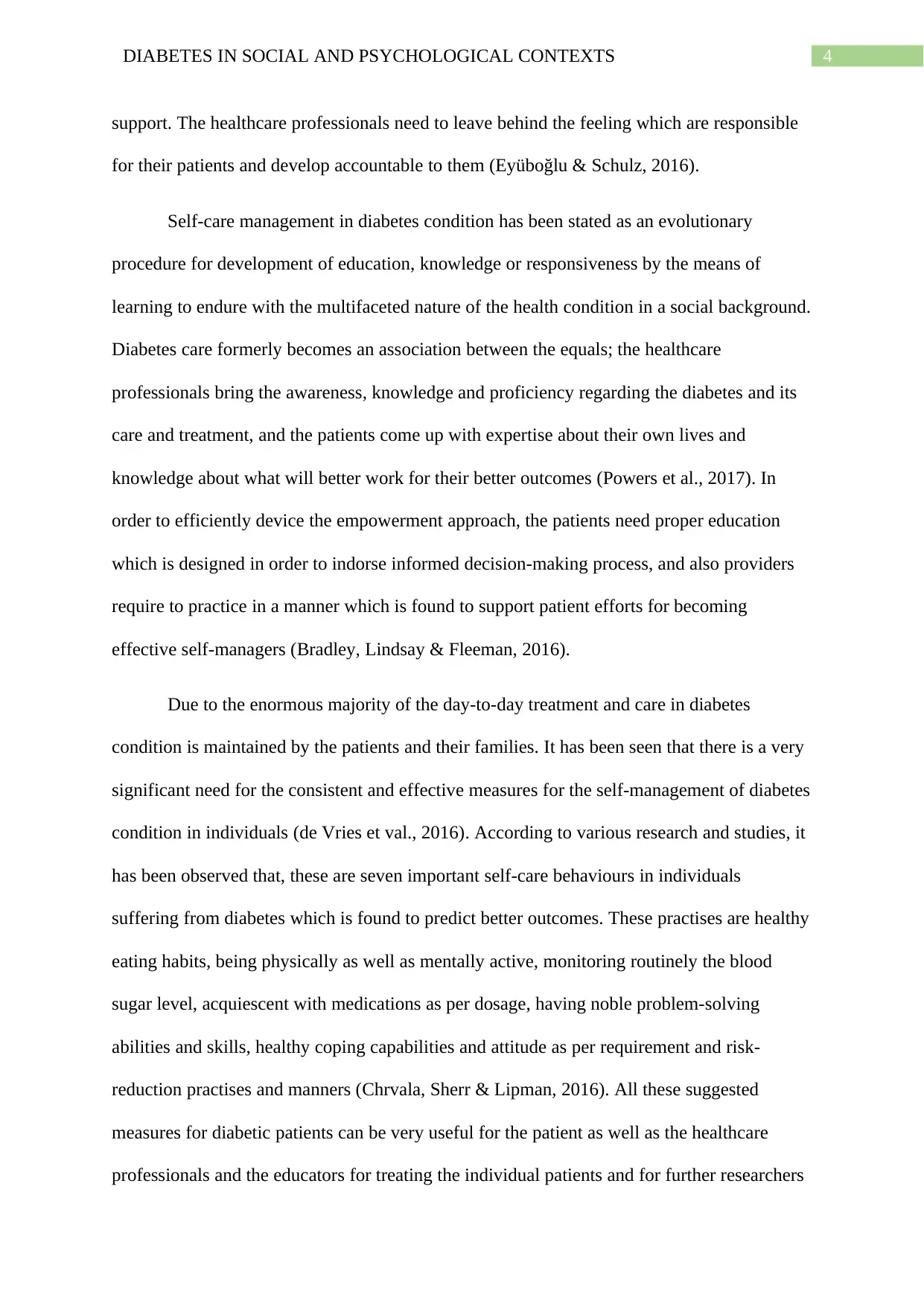
4DIABETES IN SOCIAL AND PSYCHOLOGICAL CONTEXTS
support. The healthcare professionals need to leave behind the feeling which are responsible
for their patients and develop accountable to them (Eyüboğlu & Schulz, 2016).
Self-care management in diabetes condition has been stated as an evolutionary
procedure for development of education, knowledge or responsiveness by the means of
learning to endure with the multifaceted nature of the health condition in a social background.
Diabetes care formerly becomes an association between the equals; the healthcare
professionals bring the awareness, knowledge and proficiency regarding the diabetes and its
care and treatment, and the patients come up with expertise about their own lives and
knowledge about what will better work for their better outcomes (Powers et al., 2017). In
order to efficiently device the empowerment approach, the patients need proper education
which is designed in order to indorse informed decision-making process, and also providers
require to practice in a manner which is found to support patient efforts for becoming
effective self-managers (Bradley, Lindsay & Fleeman, 2016).
Due to the enormous majority of the day-to-day treatment and care in diabetes
condition is maintained by the patients and their families. It has been seen that there is a very
significant need for the consistent and effective measures for the self-management of diabetes
condition in individuals (de Vries et val., 2016). According to various research and studies, it
has been observed that, these are seven important self-care behaviours in individuals
suffering from diabetes which is found to predict better outcomes. These practises are healthy
eating habits, being physically as well as mentally active, monitoring routinely the blood
sugar level, acquiescent with medications as per dosage, having noble problem-solving
abilities and skills, healthy coping capabilities and attitude as per requirement and risk-
reduction practises and manners (Chrvala, Sherr & Lipman, 2016). All these suggested
measures for diabetic patients can be very useful for the patient as well as the healthcare
professionals and the educators for treating the individual patients and for further researchers
support. The healthcare professionals need to leave behind the feeling which are responsible
for their patients and develop accountable to them (Eyüboğlu & Schulz, 2016).
Self-care management in diabetes condition has been stated as an evolutionary
procedure for development of education, knowledge or responsiveness by the means of
learning to endure with the multifaceted nature of the health condition in a social background.
Diabetes care formerly becomes an association between the equals; the healthcare
professionals bring the awareness, knowledge and proficiency regarding the diabetes and its
care and treatment, and the patients come up with expertise about their own lives and
knowledge about what will better work for their better outcomes (Powers et al., 2017). In
order to efficiently device the empowerment approach, the patients need proper education
which is designed in order to indorse informed decision-making process, and also providers
require to practice in a manner which is found to support patient efforts for becoming
effective self-managers (Bradley, Lindsay & Fleeman, 2016).
Due to the enormous majority of the day-to-day treatment and care in diabetes
condition is maintained by the patients and their families. It has been seen that there is a very
significant need for the consistent and effective measures for the self-management of diabetes
condition in individuals (de Vries et val., 2016). According to various research and studies, it
has been observed that, these are seven important self-care behaviours in individuals
suffering from diabetes which is found to predict better outcomes. These practises are healthy
eating habits, being physically as well as mentally active, monitoring routinely the blood
sugar level, acquiescent with medications as per dosage, having noble problem-solving
abilities and skills, healthy coping capabilities and attitude as per requirement and risk-
reduction practises and manners (Chrvala, Sherr & Lipman, 2016). All these suggested
measures for diabetic patients can be very useful for the patient as well as the healthcare
professionals and the educators for treating the individual patients and for further researchers
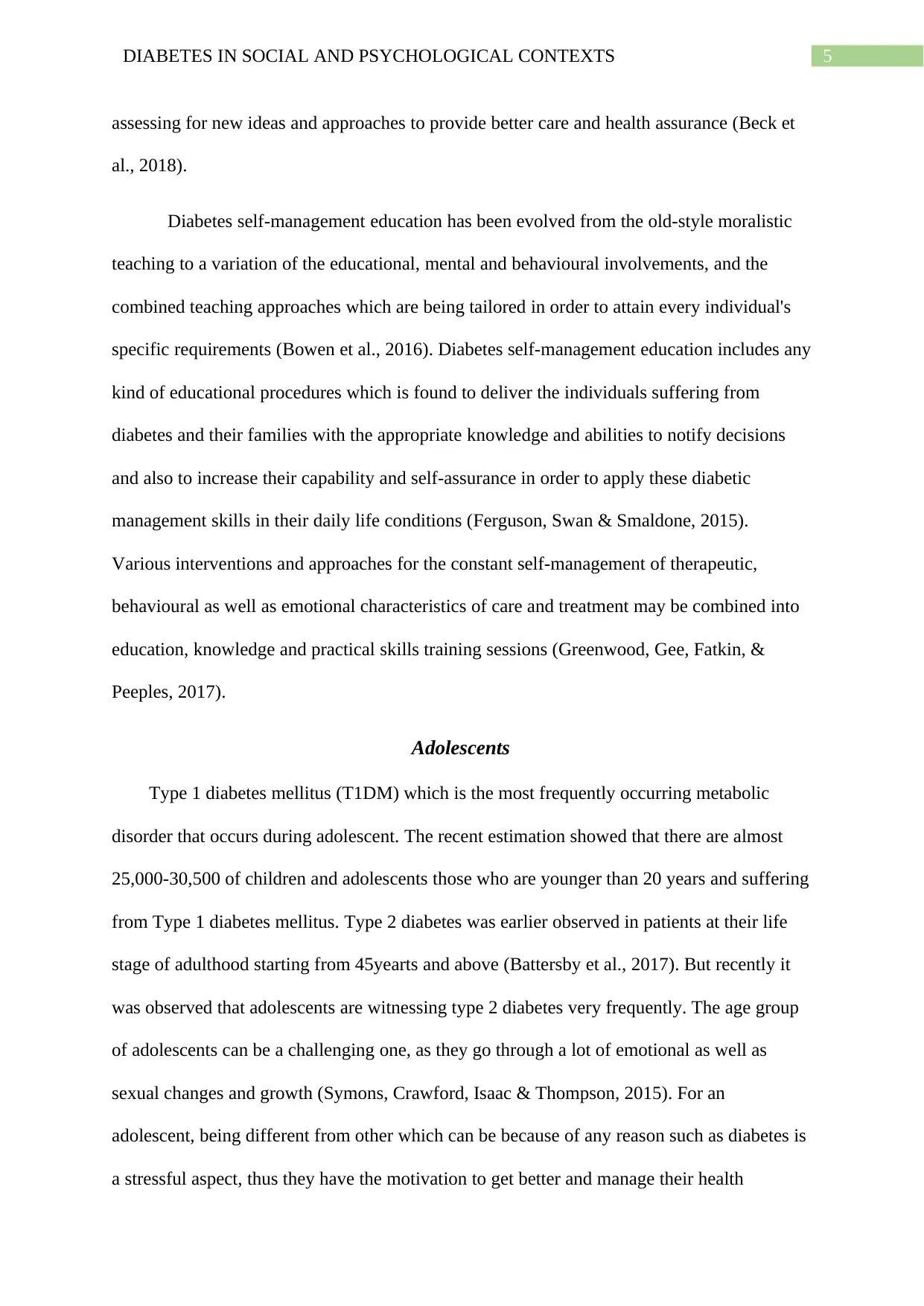
5DIABETES IN SOCIAL AND PSYCHOLOGICAL CONTEXTS
assessing for new ideas and approaches to provide better care and health assurance (Beck et
al., 2018).
Diabetes self-management education has been evolved from the old-style moralistic
teaching to a variation of the educational, mental and behavioural involvements, and the
combined teaching approaches which are being tailored in order to attain every individual's
specific requirements (Bowen et al., 2016). Diabetes self-management education includes any
kind of educational procedures which is found to deliver the individuals suffering from
diabetes and their families with the appropriate knowledge and abilities to notify decisions
and also to increase their capability and self-assurance in order to apply these diabetic
management skills in their daily life conditions (Ferguson, Swan & Smaldone, 2015).
Various interventions and approaches for the constant self-management of therapeutic,
behavioural as well as emotional characteristics of care and treatment may be combined into
education, knowledge and practical skills training sessions (Greenwood, Gee, Fatkin, &
Peeples, 2017).
Adolescents
Type 1 diabetes mellitus (T1DM) which is the most frequently occurring metabolic
disorder that occurs during adolescent. The recent estimation showed that there are almost
25,000-30,500 of children and adolescents those who are younger than 20 years and suffering
from Type 1 diabetes mellitus. Type 2 diabetes was earlier observed in patients at their life
stage of adulthood starting from 45yearts and above (Battersby et al., 2017). But recently it
was observed that adolescents are witnessing type 2 diabetes very frequently. The age group
of adolescents can be a challenging one, as they go through a lot of emotional as well as
sexual changes and growth (Symons, Crawford, Isaac & Thompson, 2015). For an
adolescent, being different from other which can be because of any reason such as diabetes is
a stressful aspect, thus they have the motivation to get better and manage their health
assessing for new ideas and approaches to provide better care and health assurance (Beck et
al., 2018).
Diabetes self-management education has been evolved from the old-style moralistic
teaching to a variation of the educational, mental and behavioural involvements, and the
combined teaching approaches which are being tailored in order to attain every individual's
specific requirements (Bowen et al., 2016). Diabetes self-management education includes any
kind of educational procedures which is found to deliver the individuals suffering from
diabetes and their families with the appropriate knowledge and abilities to notify decisions
and also to increase their capability and self-assurance in order to apply these diabetic
management skills in their daily life conditions (Ferguson, Swan & Smaldone, 2015).
Various interventions and approaches for the constant self-management of therapeutic,
behavioural as well as emotional characteristics of care and treatment may be combined into
education, knowledge and practical skills training sessions (Greenwood, Gee, Fatkin, &
Peeples, 2017).
Adolescents
Type 1 diabetes mellitus (T1DM) which is the most frequently occurring metabolic
disorder that occurs during adolescent. The recent estimation showed that there are almost
25,000-30,500 of children and adolescents those who are younger than 20 years and suffering
from Type 1 diabetes mellitus. Type 2 diabetes was earlier observed in patients at their life
stage of adulthood starting from 45yearts and above (Battersby et al., 2017). But recently it
was observed that adolescents are witnessing type 2 diabetes very frequently. The age group
of adolescents can be a challenging one, as they go through a lot of emotional as well as
sexual changes and growth (Symons, Crawford, Isaac & Thompson, 2015). For an
adolescent, being different from other which can be because of any reason such as diabetes is
a stressful aspect, thus they have the motivation to get better and manage their health
⊘ This is a preview!⊘
Do you want full access?
Subscribe today to unlock all pages.

Trusted by 1+ million students worldwide
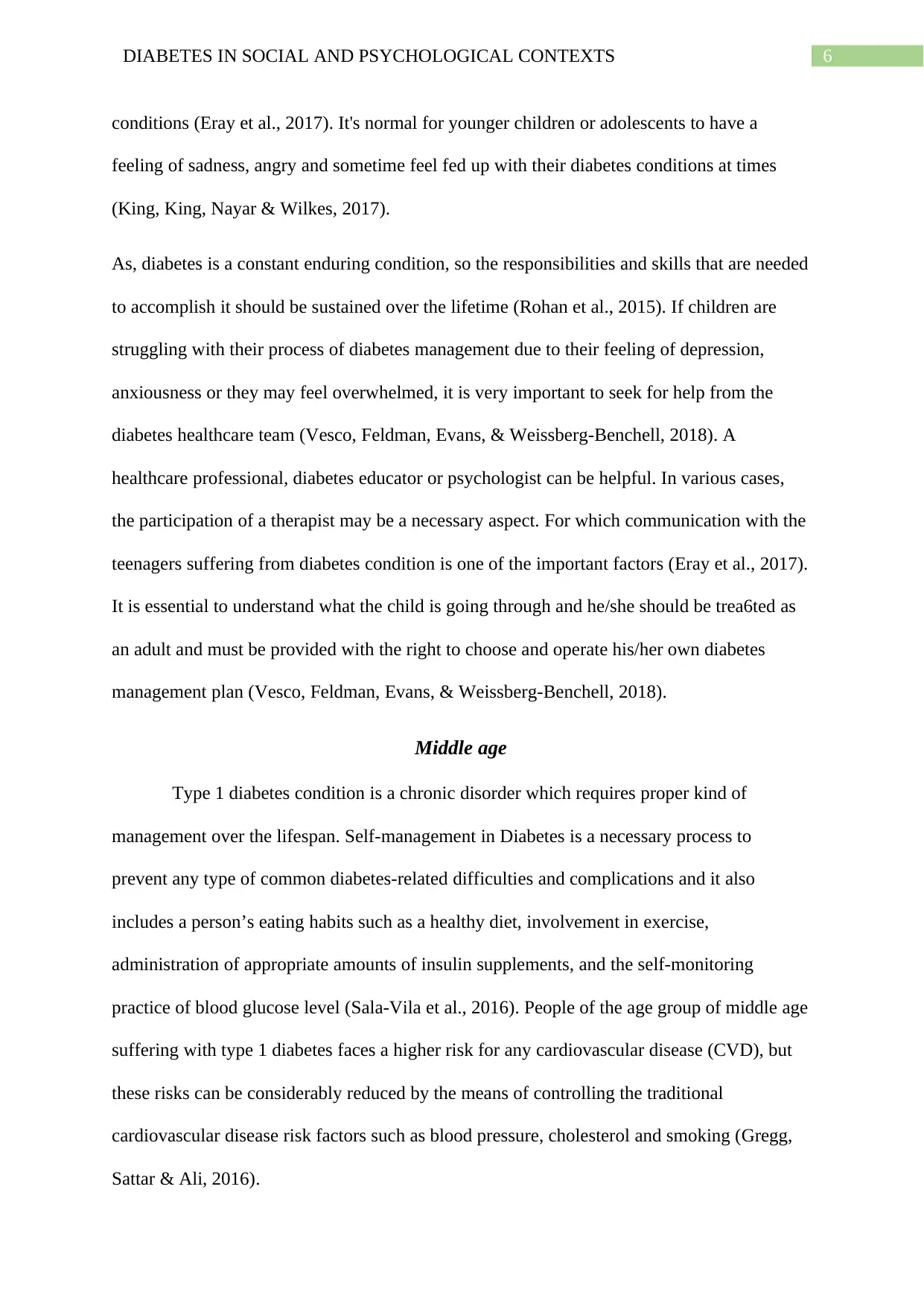
6DIABETES IN SOCIAL AND PSYCHOLOGICAL CONTEXTS
conditions (Eray et al., 2017). It's normal for younger children or adolescents to have a
feeling of sadness, angry and sometime feel fed up with their diabetes conditions at times
(King, King, Nayar & Wilkes, 2017).
As, diabetes is a constant enduring condition, so the responsibilities and skills that are needed
to accomplish it should be sustained over the lifetime (Rohan et al., 2015). If children are
struggling with their process of diabetes management due to their feeling of depression,
anxiousness or they may feel overwhelmed, it is very important to seek for help from the
diabetes healthcare team (Vesco, Feldman, Evans, & Weissberg-Benchell, 2018). A
healthcare professional, diabetes educator or psychologist can be helpful. In various cases,
the participation of a therapist may be a necessary aspect. For which communication with the
teenagers suffering from diabetes condition is one of the important factors (Eray et al., 2017).
It is essential to understand what the child is going through and he/she should be trea6ted as
an adult and must be provided with the right to choose and operate his/her own diabetes
management plan (Vesco, Feldman, Evans, & Weissberg-Benchell, 2018).
Middle age
Type 1 diabetes condition is a chronic disorder which requires proper kind of
management over the lifespan. Self-management in Diabetes is a necessary process to
prevent any type of common diabetes-related difficulties and complications and it also
includes a person’s eating habits such as a healthy diet, involvement in exercise,
administration of appropriate amounts of insulin supplements, and the self-monitoring
practice of blood glucose level (Sala-Vila et al., 2016). People of the age group of middle age
suffering with type 1 diabetes faces a higher risk for any cardiovascular disease (CVD), but
these risks can be considerably reduced by the means of controlling the traditional
cardiovascular disease risk factors such as blood pressure, cholesterol and smoking (Gregg,
Sattar & Ali, 2016).
conditions (Eray et al., 2017). It's normal for younger children or adolescents to have a
feeling of sadness, angry and sometime feel fed up with their diabetes conditions at times
(King, King, Nayar & Wilkes, 2017).
As, diabetes is a constant enduring condition, so the responsibilities and skills that are needed
to accomplish it should be sustained over the lifetime (Rohan et al., 2015). If children are
struggling with their process of diabetes management due to their feeling of depression,
anxiousness or they may feel overwhelmed, it is very important to seek for help from the
diabetes healthcare team (Vesco, Feldman, Evans, & Weissberg-Benchell, 2018). A
healthcare professional, diabetes educator or psychologist can be helpful. In various cases,
the participation of a therapist may be a necessary aspect. For which communication with the
teenagers suffering from diabetes condition is one of the important factors (Eray et al., 2017).
It is essential to understand what the child is going through and he/she should be trea6ted as
an adult and must be provided with the right to choose and operate his/her own diabetes
management plan (Vesco, Feldman, Evans, & Weissberg-Benchell, 2018).
Middle age
Type 1 diabetes condition is a chronic disorder which requires proper kind of
management over the lifespan. Self-management in Diabetes is a necessary process to
prevent any type of common diabetes-related difficulties and complications and it also
includes a person’s eating habits such as a healthy diet, involvement in exercise,
administration of appropriate amounts of insulin supplements, and the self-monitoring
practice of blood glucose level (Sala-Vila et al., 2016). People of the age group of middle age
suffering with type 1 diabetes faces a higher risk for any cardiovascular disease (CVD), but
these risks can be considerably reduced by the means of controlling the traditional
cardiovascular disease risk factors such as blood pressure, cholesterol and smoking (Gregg,
Sattar & Ali, 2016).
Paraphrase This Document
Need a fresh take? Get an instant paraphrase of this document with our AI Paraphraser
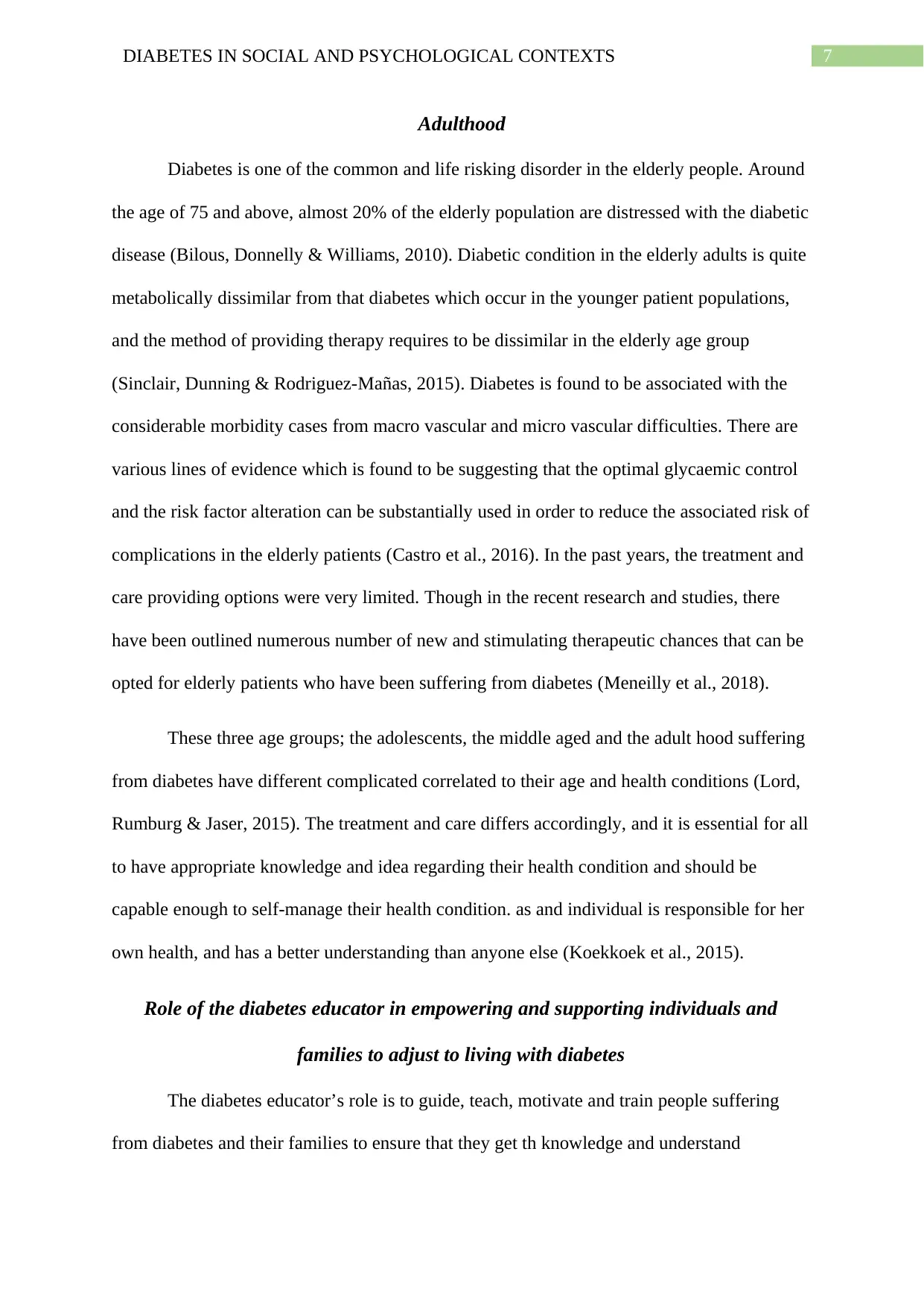
7DIABETES IN SOCIAL AND PSYCHOLOGICAL CONTEXTS
Adulthood
Diabetes is one of the common and life risking disorder in the elderly people. Around
the age of 75 and above, almost 20% of the elderly population are distressed with the diabetic
disease (Bilous, Donnelly & Williams, 2010). Diabetic condition in the elderly adults is quite
metabolically dissimilar from that diabetes which occur in the younger patient populations,
and the method of providing therapy requires to be dissimilar in the elderly age group
(Sinclair, Dunning & Rodriguez-Mañas, 2015). Diabetes is found to be associated with the
considerable morbidity cases from macro vascular and micro vascular difficulties. There are
various lines of evidence which is found to be suggesting that the optimal glycaemic control
and the risk factor alteration can be substantially used in order to reduce the associated risk of
complications in the elderly patients (Castro et al., 2016). In the past years, the treatment and
care providing options were very limited. Though in the recent research and studies, there
have been outlined numerous number of new and stimulating therapeutic chances that can be
opted for elderly patients who have been suffering from diabetes (Meneilly et al., 2018).
These three age groups; the adolescents, the middle aged and the adult hood suffering
from diabetes have different complicated correlated to their age and health conditions (Lord,
Rumburg & Jaser, 2015). The treatment and care differs accordingly, and it is essential for all
to have appropriate knowledge and idea regarding their health condition and should be
capable enough to self-manage their health condition. as and individual is responsible for her
own health, and has a better understanding than anyone else (Koekkoek et al., 2015).
Role of the diabetes educator in empowering and supporting individuals and
families to adjust to living with diabetes
The diabetes educator’s role is to guide, teach, motivate and train people suffering
from diabetes and their families to ensure that they get th knowledge and understand
Adulthood
Diabetes is one of the common and life risking disorder in the elderly people. Around
the age of 75 and above, almost 20% of the elderly population are distressed with the diabetic
disease (Bilous, Donnelly & Williams, 2010). Diabetic condition in the elderly adults is quite
metabolically dissimilar from that diabetes which occur in the younger patient populations,
and the method of providing therapy requires to be dissimilar in the elderly age group
(Sinclair, Dunning & Rodriguez-Mañas, 2015). Diabetes is found to be associated with the
considerable morbidity cases from macro vascular and micro vascular difficulties. There are
various lines of evidence which is found to be suggesting that the optimal glycaemic control
and the risk factor alteration can be substantially used in order to reduce the associated risk of
complications in the elderly patients (Castro et al., 2016). In the past years, the treatment and
care providing options were very limited. Though in the recent research and studies, there
have been outlined numerous number of new and stimulating therapeutic chances that can be
opted for elderly patients who have been suffering from diabetes (Meneilly et al., 2018).
These three age groups; the adolescents, the middle aged and the adult hood suffering
from diabetes have different complicated correlated to their age and health conditions (Lord,
Rumburg & Jaser, 2015). The treatment and care differs accordingly, and it is essential for all
to have appropriate knowledge and idea regarding their health condition and should be
capable enough to self-manage their health condition. as and individual is responsible for her
own health, and has a better understanding than anyone else (Koekkoek et al., 2015).
Role of the diabetes educator in empowering and supporting individuals and
families to adjust to living with diabetes
The diabetes educator’s role is to guide, teach, motivate and train people suffering
from diabetes and their families to ensure that they get th knowledge and understand
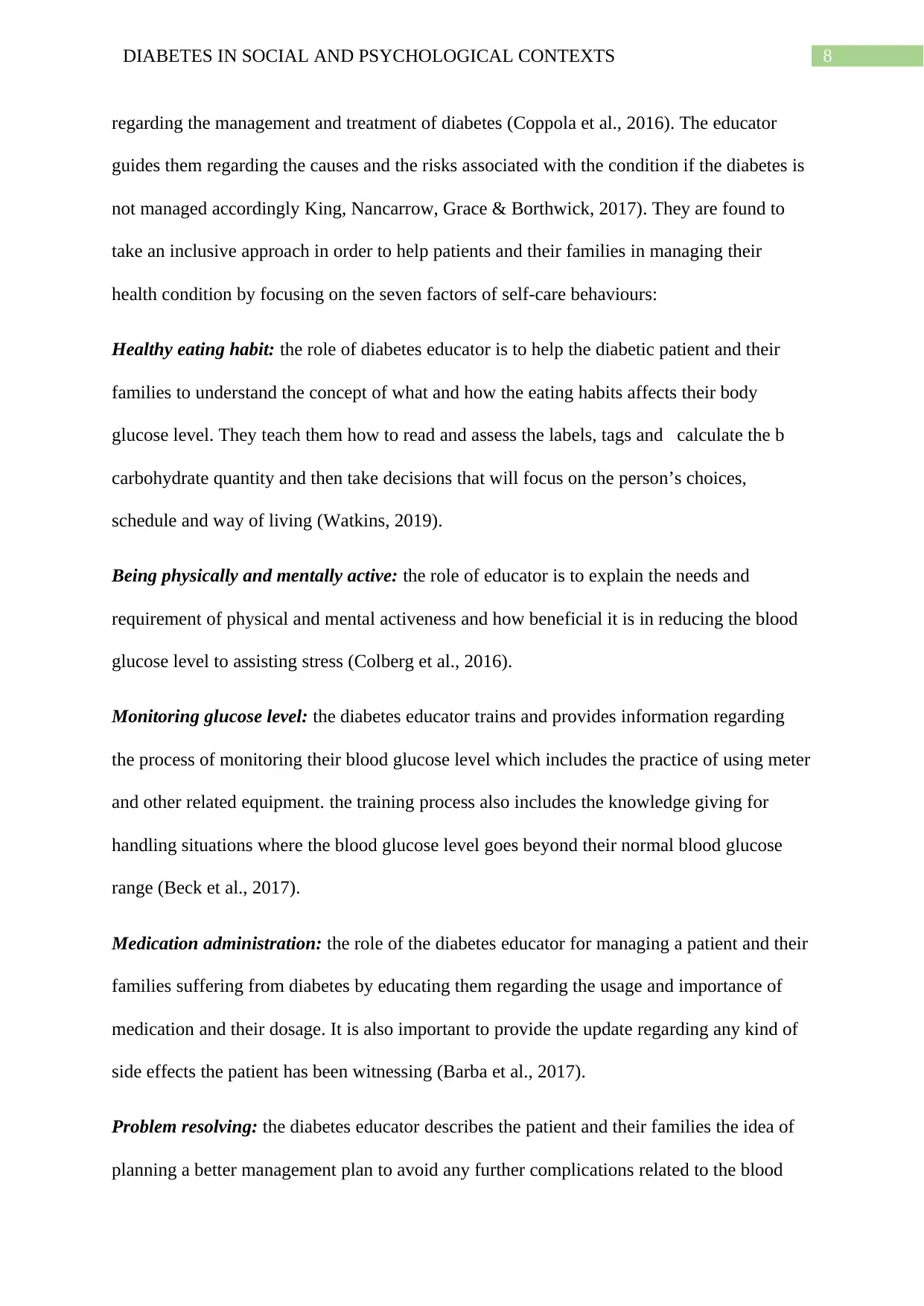
8DIABETES IN SOCIAL AND PSYCHOLOGICAL CONTEXTS
regarding the management and treatment of diabetes (Coppola et al., 2016). The educator
guides them regarding the causes and the risks associated with the condition if the diabetes is
not managed accordingly King, Nancarrow, Grace & Borthwick, 2017). They are found to
take an inclusive approach in order to help patients and their families in managing their
health condition by focusing on the seven factors of self-care behaviours:
Healthy eating habit: the role of diabetes educator is to help the diabetic patient and their
families to understand the concept of what and how the eating habits affects their body
glucose level. They teach them how to read and assess the labels, tags and calculate the b
carbohydrate quantity and then take decisions that will focus on the person’s choices,
schedule and way of living (Watkins, 2019).
Being physically and mentally active: the role of educator is to explain the needs and
requirement of physical and mental activeness and how beneficial it is in reducing the blood
glucose level to assisting stress (Colberg et al., 2016).
Monitoring glucose level: the diabetes educator trains and provides information regarding
the process of monitoring their blood glucose level which includes the practice of using meter
and other related equipment. the training process also includes the knowledge giving for
handling situations where the blood glucose level goes beyond their normal blood glucose
range (Beck et al., 2017).
Medication administration: the role of the diabetes educator for managing a patient and their
families suffering from diabetes by educating them regarding the usage and importance of
medication and their dosage. It is also important to provide the update regarding any kind of
side effects the patient has been witnessing (Barba et al., 2017).
Problem resolving: the diabetes educator describes the patient and their families the idea of
planning a better management plan to avoid any further complications related to the blood
regarding the management and treatment of diabetes (Coppola et al., 2016). The educator
guides them regarding the causes and the risks associated with the condition if the diabetes is
not managed accordingly King, Nancarrow, Grace & Borthwick, 2017). They are found to
take an inclusive approach in order to help patients and their families in managing their
health condition by focusing on the seven factors of self-care behaviours:
Healthy eating habit: the role of diabetes educator is to help the diabetic patient and their
families to understand the concept of what and how the eating habits affects their body
glucose level. They teach them how to read and assess the labels, tags and calculate the b
carbohydrate quantity and then take decisions that will focus on the person’s choices,
schedule and way of living (Watkins, 2019).
Being physically and mentally active: the role of educator is to explain the needs and
requirement of physical and mental activeness and how beneficial it is in reducing the blood
glucose level to assisting stress (Colberg et al., 2016).
Monitoring glucose level: the diabetes educator trains and provides information regarding
the process of monitoring their blood glucose level which includes the practice of using meter
and other related equipment. the training process also includes the knowledge giving for
handling situations where the blood glucose level goes beyond their normal blood glucose
range (Beck et al., 2017).
Medication administration: the role of the diabetes educator for managing a patient and their
families suffering from diabetes by educating them regarding the usage and importance of
medication and their dosage. It is also important to provide the update regarding any kind of
side effects the patient has been witnessing (Barba et al., 2017).
Problem resolving: the diabetes educator describes the patient and their families the idea of
planning a better management plan to avoid any further complications related to the blood
⊘ This is a preview!⊘
Do you want full access?
Subscribe today to unlock all pages.

Trusted by 1+ million students worldwide
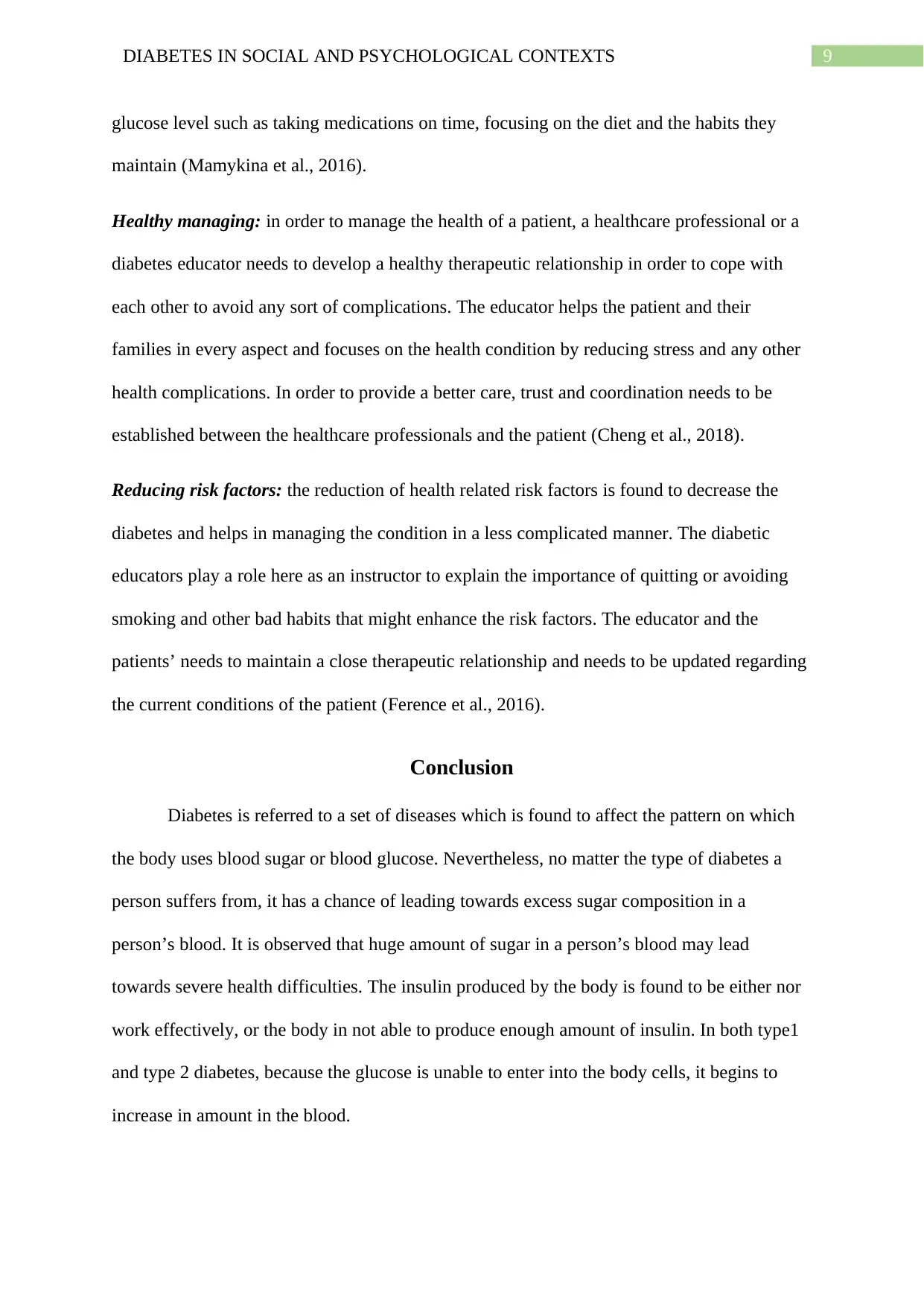
9DIABETES IN SOCIAL AND PSYCHOLOGICAL CONTEXTS
glucose level such as taking medications on time, focusing on the diet and the habits they
maintain (Mamykina et al., 2016).
Healthy managing: in order to manage the health of a patient, a healthcare professional or a
diabetes educator needs to develop a healthy therapeutic relationship in order to cope with
each other to avoid any sort of complications. The educator helps the patient and their
families in every aspect and focuses on the health condition by reducing stress and any other
health complications. In order to provide a better care, trust and coordination needs to be
established between the healthcare professionals and the patient (Cheng et al., 2018).
Reducing risk factors: the reduction of health related risk factors is found to decrease the
diabetes and helps in managing the condition in a less complicated manner. The diabetic
educators play a role here as an instructor to explain the importance of quitting or avoiding
smoking and other bad habits that might enhance the risk factors. The educator and the
patients’ needs to maintain a close therapeutic relationship and needs to be updated regarding
the current conditions of the patient (Ference et al., 2016).
Conclusion
Diabetes is referred to a set of diseases which is found to affect the pattern on which
the body uses blood sugar or blood glucose. Nevertheless, no matter the type of diabetes a
person suffers from, it has a chance of leading towards excess sugar composition in a
person’s blood. It is observed that huge amount of sugar in a person’s blood may lead
towards severe health difficulties. The insulin produced by the body is found to be either nor
work effectively, or the body in not able to produce enough amount of insulin. In both type1
and type 2 diabetes, because the glucose is unable to enter into the body cells, it begins to
increase in amount in the blood.
glucose level such as taking medications on time, focusing on the diet and the habits they
maintain (Mamykina et al., 2016).
Healthy managing: in order to manage the health of a patient, a healthcare professional or a
diabetes educator needs to develop a healthy therapeutic relationship in order to cope with
each other to avoid any sort of complications. The educator helps the patient and their
families in every aspect and focuses on the health condition by reducing stress and any other
health complications. In order to provide a better care, trust and coordination needs to be
established between the healthcare professionals and the patient (Cheng et al., 2018).
Reducing risk factors: the reduction of health related risk factors is found to decrease the
diabetes and helps in managing the condition in a less complicated manner. The diabetic
educators play a role here as an instructor to explain the importance of quitting or avoiding
smoking and other bad habits that might enhance the risk factors. The educator and the
patients’ needs to maintain a close therapeutic relationship and needs to be updated regarding
the current conditions of the patient (Ference et al., 2016).
Conclusion
Diabetes is referred to a set of diseases which is found to affect the pattern on which
the body uses blood sugar or blood glucose. Nevertheless, no matter the type of diabetes a
person suffers from, it has a chance of leading towards excess sugar composition in a
person’s blood. It is observed that huge amount of sugar in a person’s blood may lead
towards severe health difficulties. The insulin produced by the body is found to be either nor
work effectively, or the body in not able to produce enough amount of insulin. In both type1
and type 2 diabetes, because the glucose is unable to enter into the body cells, it begins to
increase in amount in the blood.
Paraphrase This Document
Need a fresh take? Get an instant paraphrase of this document with our AI Paraphraser
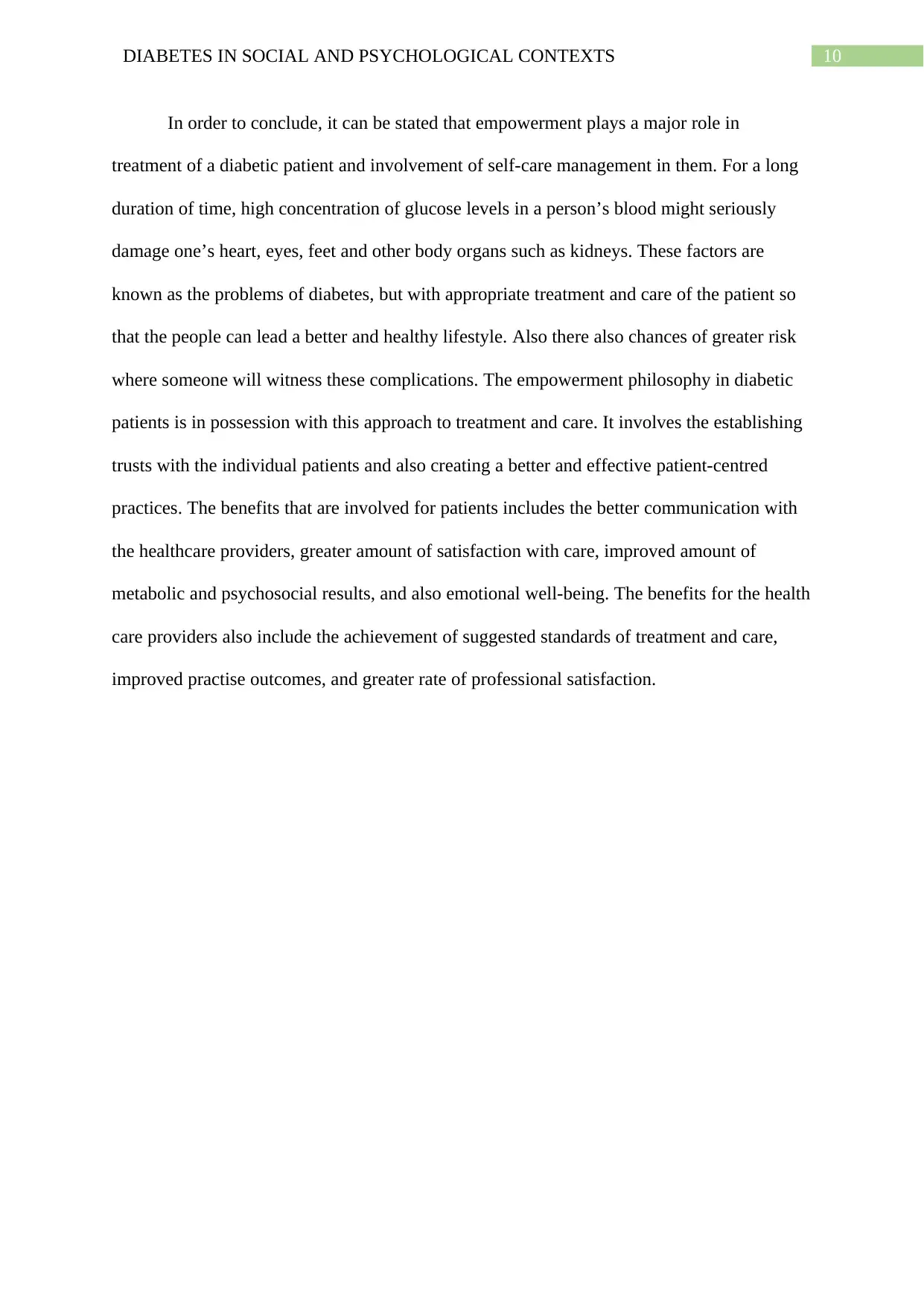
10DIABETES IN SOCIAL AND PSYCHOLOGICAL CONTEXTS
In order to conclude, it can be stated that empowerment plays a major role in
treatment of a diabetic patient and involvement of self-care management in them. For a long
duration of time, high concentration of glucose levels in a person’s blood might seriously
damage one’s heart, eyes, feet and other body organs such as kidneys. These factors are
known as the problems of diabetes, but with appropriate treatment and care of the patient so
that the people can lead a better and healthy lifestyle. Also there also chances of greater risk
where someone will witness these complications. The empowerment philosophy in diabetic
patients is in possession with this approach to treatment and care. It involves the establishing
trusts with the individual patients and also creating a better and effective patient-centred
practices. The benefits that are involved for patients includes the better communication with
the healthcare providers, greater amount of satisfaction with care, improved amount of
metabolic and psychosocial results, and also emotional well-being. The benefits for the health
care providers also include the achievement of suggested standards of treatment and care,
improved practise outcomes, and greater rate of professional satisfaction.
In order to conclude, it can be stated that empowerment plays a major role in
treatment of a diabetic patient and involvement of self-care management in them. For a long
duration of time, high concentration of glucose levels in a person’s blood might seriously
damage one’s heart, eyes, feet and other body organs such as kidneys. These factors are
known as the problems of diabetes, but with appropriate treatment and care of the patient so
that the people can lead a better and healthy lifestyle. Also there also chances of greater risk
where someone will witness these complications. The empowerment philosophy in diabetic
patients is in possession with this approach to treatment and care. It involves the establishing
trusts with the individual patients and also creating a better and effective patient-centred
practices. The benefits that are involved for patients includes the better communication with
the healthcare providers, greater amount of satisfaction with care, improved amount of
metabolic and psychosocial results, and also emotional well-being. The benefits for the health
care providers also include the achievement of suggested standards of treatment and care,
improved practise outcomes, and greater rate of professional satisfaction.
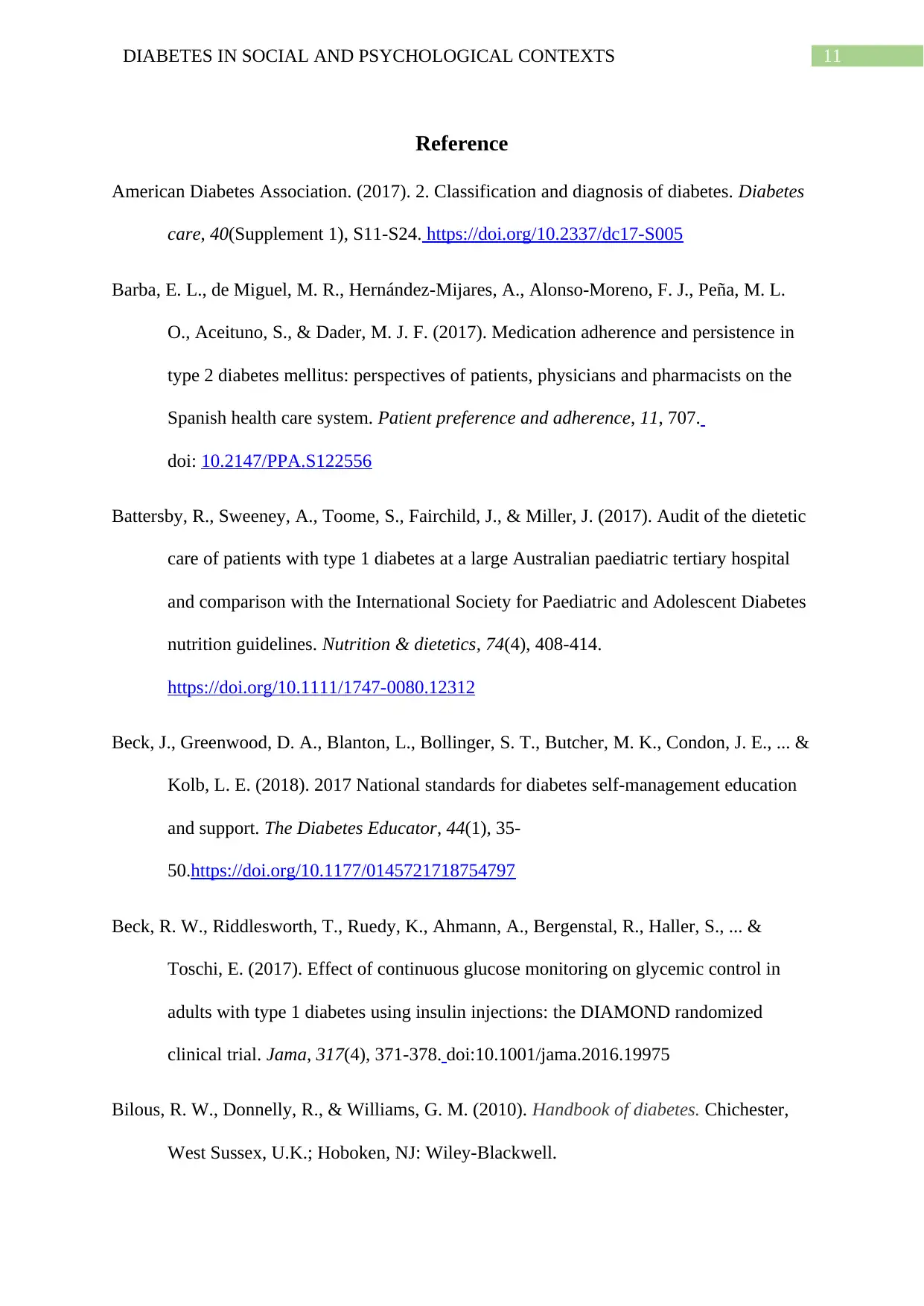
11DIABETES IN SOCIAL AND PSYCHOLOGICAL CONTEXTS
Reference
American Diabetes Association. (2017). 2. Classification and diagnosis of diabetes. Diabetes
care, 40(Supplement 1), S11-S24. https://doi.org/10.2337/dc17-S005
Barba, E. L., de Miguel, M. R., Hernández-Mijares, A., Alonso-Moreno, F. J., Peña, M. L.
O., Aceituno, S., & Dader, M. J. F. (2017). Medication adherence and persistence in
type 2 diabetes mellitus: perspectives of patients, physicians and pharmacists on the
Spanish health care system. Patient preference and adherence, 11, 707.
doi: 10.2147/PPA.S122556
Battersby, R., Sweeney, A., Toome, S., Fairchild, J., & Miller, J. (2017). Audit of the dietetic
care of patients with type 1 diabetes at a large Australian paediatric tertiary hospital
and comparison with the International Society for Paediatric and Adolescent Diabetes
nutrition guidelines. Nutrition & dietetics, 74(4), 408-414.
https://doi.org/10.1111/1747-0080.12312
Beck, J., Greenwood, D. A., Blanton, L., Bollinger, S. T., Butcher, M. K., Condon, J. E., ... &
Kolb, L. E. (2018). 2017 National standards for diabetes self-management education
and support. The Diabetes Educator, 44(1), 35-
50.https://doi.org/10.1177/0145721718754797
Beck, R. W., Riddlesworth, T., Ruedy, K., Ahmann, A., Bergenstal, R., Haller, S., ... &
Toschi, E. (2017). Effect of continuous glucose monitoring on glycemic control in
adults with type 1 diabetes using insulin injections: the DIAMOND randomized
clinical trial. Jama, 317(4), 371-378. doi:10.1001/jama.2016.19975
Bilous, R. W., Donnelly, R., & Williams, G. M. (2010). Handbook of diabetes. Chichester,
West Sussex, U.K.; Hoboken, NJ: Wiley-Blackwell.
Reference
American Diabetes Association. (2017). 2. Classification and diagnosis of diabetes. Diabetes
care, 40(Supplement 1), S11-S24. https://doi.org/10.2337/dc17-S005
Barba, E. L., de Miguel, M. R., Hernández-Mijares, A., Alonso-Moreno, F. J., Peña, M. L.
O., Aceituno, S., & Dader, M. J. F. (2017). Medication adherence and persistence in
type 2 diabetes mellitus: perspectives of patients, physicians and pharmacists on the
Spanish health care system. Patient preference and adherence, 11, 707.
doi: 10.2147/PPA.S122556
Battersby, R., Sweeney, A., Toome, S., Fairchild, J., & Miller, J. (2017). Audit of the dietetic
care of patients with type 1 diabetes at a large Australian paediatric tertiary hospital
and comparison with the International Society for Paediatric and Adolescent Diabetes
nutrition guidelines. Nutrition & dietetics, 74(4), 408-414.
https://doi.org/10.1111/1747-0080.12312
Beck, J., Greenwood, D. A., Blanton, L., Bollinger, S. T., Butcher, M. K., Condon, J. E., ... &
Kolb, L. E. (2018). 2017 National standards for diabetes self-management education
and support. The Diabetes Educator, 44(1), 35-
50.https://doi.org/10.1177/0145721718754797
Beck, R. W., Riddlesworth, T., Ruedy, K., Ahmann, A., Bergenstal, R., Haller, S., ... &
Toschi, E. (2017). Effect of continuous glucose monitoring on glycemic control in
adults with type 1 diabetes using insulin injections: the DIAMOND randomized
clinical trial. Jama, 317(4), 371-378. doi:10.1001/jama.2016.19975
Bilous, R. W., Donnelly, R., & Williams, G. M. (2010). Handbook of diabetes. Chichester,
West Sussex, U.K.; Hoboken, NJ: Wiley-Blackwell.
⊘ This is a preview!⊘
Do you want full access?
Subscribe today to unlock all pages.

Trusted by 1+ million students worldwide
1 out of 19
Related Documents
Your All-in-One AI-Powered Toolkit for Academic Success.
+13062052269
info@desklib.com
Available 24*7 on WhatsApp / Email
![[object Object]](/_next/static/media/star-bottom.7253800d.svg)
Unlock your academic potential
Copyright © 2020–2026 A2Z Services. All Rights Reserved. Developed and managed by ZUCOL.




